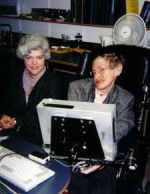Column Name
Title
While it’s true that a Juilliard education has prepared graduates for all sorts of careers, some are more surprising than others. Take Kitty Vetter Ferguson (B.M. ’65, M.S. ’66, voice). The former voice major has carved out a career as a science writer; her most recent book is a biography of the world’s most well-known theoretical physicist. Her Stephen Hawking: An Unfettered Mind (Palgrave Macmillan), which came out in January (to coincide with Hawking’s 70th birthday), takes up where her Stephen Hawking: A Quest for the Theory of Everything (1992), had left off. Nick Stagliano caught up with Ferguson when she was between stops on her book tour.
Body
How did you end up at Juilliard?
I grew up in San Antonio, Tex., in a very musical family, and I always loved music. My mother was a singer, my sister [Virginia Vetter Smith Sandford, B.M. ’69, piano] also attended Juilliard, and I went to a remarkable high school, where we once performed scenes from Der Rosenkavalier. I sang and played the flute—and loved both—and when it came time to audition for Juilliard, it was hard to decide what instrument to audition on.
How did you decide?
For practical reasons: I would have had to purchase a much better flute than the one I had been using, and neither I nor my parents could afford that.
Did you continue with the flute once you got to Juilliard?
In Literature and Materials class, I had to compose a short sonata and wrote it for flute and piano, which I performed for the class. Otherwise, I didn’t; I found that the way I was playing tightened my throat in a way that wasn’t good for my voice.
Did you have a career as a performer before you began writing?
I always wanted to be a Wagnerian soprano, but I didn’t have a big enough voice to consider an operatic career, so I did lieder singing and worked with a variety of choirs, instrumental ensembles, and big professional choruses, including performing with the New York Philharmonic under Bernstein, Stravinsky, and other great conductors. I was usually the person picked out to sing the little chorus solos, and I was once the soprano soloist for a New York City Ballet production of A Midsummer Night’s Dream. It wasn’t a huge professional career, but I’ve never regretted going into music—it was such a joy.
One of my most significant accomplishments was establishing the Chester [N.J.] Ensemble and researching and producing a huge concert of music from around the time of the American Revolution for the Bicentennial. We performed it in small, candlelit churches with a mix of big and small choirs, and it was a great pleasure.
How did you make what seems like a large leap from music to science?
It actually was not as huge a change as it might seem. While I was brought up in a very musical family, my father was also a huge math and science aficionado. He taught us about the solar system by arranging the salt and pepper shakers on the kitchen table, and when I was 8 years old, I remember my father taking me and my siblings out to measure the height of windmills using their shadows. As a result, I always thought of science not as something for school or something that a bunch of other smart people did that I didn’t, but as something we did for fun. And that, of course, is Stephen Hawking’s way of doing science.
And how about the leap to writing?
When my daughter, Caitlin, was 8 years old, she wanted to do a school project on black holes. She had brought home all these complicated books, and I had just finished reading A Brief History of Time, which I’d reread until I understood it. Her project was a great success, and my husband suggested I write a children’s book. At first I said no, I had other things I wanted to do. But then he said, “I think I’ll take that project,” and I decided I’d better be the one to do it! I thought: who better to ask about this topic than Stephen Hawking? [At the time Ferguson was living in Cambridge, England, where her husband—and Hawking—were both professors.] After I had talked with him quite a bit and noticed that there wasn’t already a biography of him, I decided then that I would try to write one, which I began in about 1990. And about 10 years later, his publisher asked me to help edit The Universe in a Nutshell. My job was to help make it simpler.
What’s it like working with him?
We would sit side-by-side behind his computer screen, and at first I was rather frightened thinking about it, but he made me feel very comfortable, and working with him was very peaceful and quiet. At one point as we were going through the manuscript, I said “Stephen, I think these two sentences need to be stated more simply,” and he replied, “It seems clear to me.” All I could think was, “We’re in trouble,” but then I looked over at him, and he was grinning.
Has music played a part in your writing?
Very much so. All of my books have references to music because so many seemingly off-the-wall scientific phenomena are observable in music.





